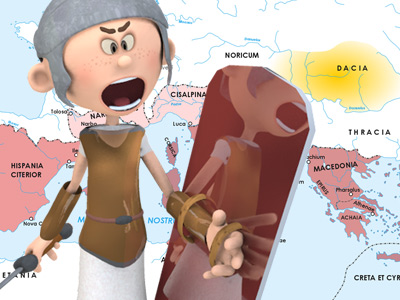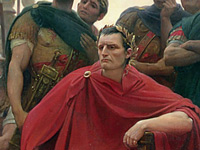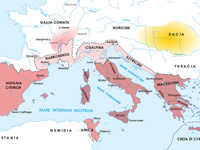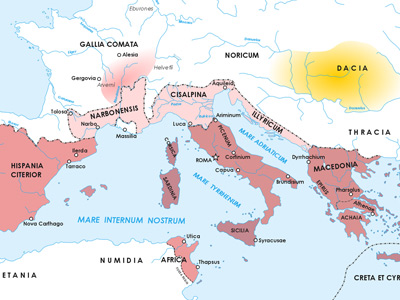Great Roman Civil War (49–45 BC)

Later Campaign in Africa and the War on Cato
Caesar returned to Rome to deal with several mutinous legions. While Caesar had been in Egypt installing Cleopatra as Queen, four of his veteran legions encamped outside of Rome under the command of Mark Antony. The legions were waiting for their discharges and the bonus pay Caesar had promised them before the battle of Pharsalus. As Caesar lingered in Egypt, the situation quickly deteriorated. Antony lost control of the troops and they began looting estates south of the capital. Several delegations of diplomats were dispatched to try to quell the mutiny.
Nothing worked and the mutineers continued to call for their discharges and back pay. After several months, Caesar finally arrived to address the legions in person. Caesar knew he needed these legions to deal with Pompey's supporters in north Africa, who had mustered 14 legions of their own. Caesar also knew that he did not have the funds to give the soldiers their back pay, much less the money needed to induce them to reenlist for the north African campaign.
When Caesar Julius Caesar (100-44 BC), was a Roman politician and general who played a critical role in the events that led to the demise of the Roman Republic and the rise of the Roman Empire. Caesar is considered by many historians to be one of the greatest military commanders in history. Julius Caesar » approached the speaker's dais, a hush fell over the mutinous soldiers. Most were embarrassed by their role in the mutiny in Caesar's presence. Caesar asked the troops what they wanted with his cold voice. Ashamed to demand money, the men began to call out for their discharge. Caesar bluntly addressed them as "citizens" instead of "soldiers," a tacit indication that they had already discharged themselves by virtue of their disloyalty.
Julius Caesar (100-44 BC), was a Roman politician and general who played a critical role in the events that led to the demise of the Roman Republic and the rise of the Roman Empire. Caesar is considered by many historians to be one of the greatest military commanders in history. Julius Caesar » approached the speaker's dais, a hush fell over the mutinous soldiers. Most were embarrassed by their role in the mutiny in Caesar's presence. Caesar asked the troops what they wanted with his cold voice. Ashamed to demand money, the men began to call out for their discharge. Caesar bluntly addressed them as "citizens" instead of "soldiers," a tacit indication that they had already discharged themselves by virtue of their disloyalty.
He went on to tell them that they would all be discharged immediately. He said he would pay them the money he owed them after he won the north African campaign with other Roman The Roman Republic was a form of government of Rome and the era of the classical Roman civilization when it was run through public representation of the Roman people. Beginning with the overthrow of the Roman Kingdom (traditionally dated to 509 BC) and ending in 27 BC with the establishment of the Roman Empire, Rome's control rapidly expanded during this period - from the city's immediate surroundings to hegemony over the entire Mediterranean world. legions. The soldiers were shocked. They had been through 15 years of war with Caesar and they had become fiercely loyal to him in the process. It had never occurred to them that Caesar did not need them.
The Roman Republic was a form of government of Rome and the era of the classical Roman civilization when it was run through public representation of the Roman people. Beginning with the overthrow of the Roman Kingdom (traditionally dated to 509 BC) and ending in 27 BC with the establishment of the Roman Empire, Rome's control rapidly expanded during this period - from the city's immediate surroundings to hegemony over the entire Mediterranean world. legions. The soldiers were shocked. They had been through 15 years of war with Caesar and they had become fiercely loyal to him in the process. It had never occurred to them that Caesar did not need them.
The soldiers' resistance collapsed. They crowded the dais and begged to be taken to north Africa. Caesar feigned indignation and then allowed himself to be won over. When he announced that he would suffer to bring them along, a huge cheer arose from the assembled troops. Through this reverse psychology, Caesar reenlisted four enthusiastic veteran legions to invade north Africa without spending a single sesterce.
Caesar quickly gained a significant victory at Thapsus in 46 BC over the forces of Metellus Scipio, Cato the Younger and Juba (who all committed suicide).
HISTORY

RESOURCES
This article uses material from the Wikipedia article "Caesar's Civil War", which is released under the Creative Commons Attribution-Share-Alike License 3.0.
© Stories Preschool. All Rights Reserved.









